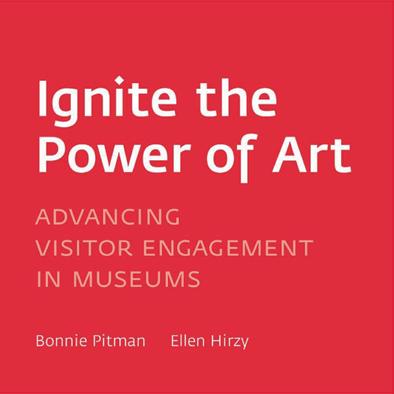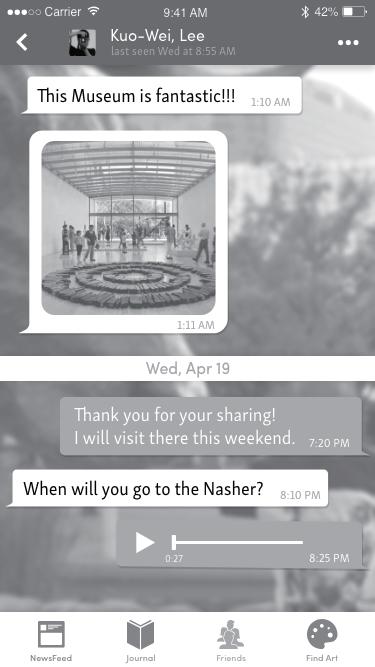ArtSide Overview



Enhancing the Connection Between Cities and Communities







What would life be like without frework displays, puppet parades, sculpture parks, and visionary roadside folk art? Tese landmarks and special events enhance our experience of a place and our quality of life. Public art creates a sense of pride and community identity. It represents the public history of cities, enriches the culture, and refects public thinking in society. Public art can create meaningful relationships between cities and their citizens.

ArtSide is a mobile application that enhances the connection between cities & citizen


Te goal of ArtSide is to enhance the social experience of public art through social and technological means to strengthen the relationship between the city and its community. ArtSide is a mobile application prototype that indicates the location of public art and provides a social platform to interact with others about pieces.

Golden Circle
“People don’t buy what you do. Tey buy why you do it.”
– Simon Sinek
Simon Sinek's Golden Circle is an attempt to explain why some people and organisations are particularly able to inspire others and diferentiate themselves successfully. Te neuroscience behind the Golden Circle idea is that humans respond best when messages communicate with those parts of their brain that control emotions, behaviour, and decision-making.
Act, Think & Communicate from Inside Out
WHY - Purpose Motivation. What do I believe?
WHY
HOW WHAT
HOW - Process
Specifc actions taking Why into practice
Te demonstration of Why WHAT - Result
WHY - Purpose
Motivation. What do I believe?
We believe public art engages the community in civic dialogue and it helps us be conscious of the city culture, city history, and the city itself.

Te goal of ArtSide proposal is to enhance the social experience of Public Art through social and technological means to strengthen the relationship between city and its communities.
ArtSide not only provides information about where art is located, but also lets users experience art and share their thoughts. Te motivation is to activate the users through the sharing of art, and to connect artists and art lovers together to create a community. Since public art has a wide variety of forms, types, and locations, each individual has their diferent views on these topics. Te meaning of public art, therefore, changes with the passage of time. We gathered opinions from both experts and the general public so that those who use ArtSide would be satisfed and more user friendly.
HOW - Process
Specifc actions taking Why into practice
We did the research on Public Art and art community to conceive and design a social service to enhance the experience of Public Art. Since I took professor Cassini Nazir’s Infomation Architecture and Design class, I have learned the knowlege of information architecture. Information architecture can be applied to any complicated system. In contrast to popular notion of design, information architecture is concerned with logical information design, not physical, visual, or aesthetic design. It represents the threads of the invisible stitching within a seamless experience.
Te design process can be quite messy.
Designers have series of repeatable steps that make them true professionals.
WHAT - Result
Te demonstration of Why
ArtSide: Enhancing the Connection Between Cities and Communities.
My master thesis project provides a platform that create a bridge between city and its community to share the experience of Public Art. ArtSide is a mobile application that provides a social platform to interaction with others about the pieces.
Tis interactivity engages people of the community to provide input, opinions, experiences, and stories and build meaning and shared memories for their communities.

The
An
Before I knew what Information Archetecture was, I always had a hard time making myself and my clients feel comfortable with a design process that starts with a big fuzzy mess, not knowing entirely what comes out in the other end. It makes it harder to describe what is the progress actually going on. Afer all, it is a mess of research, ideas, data, drawing, crafing, testing and failing.
Design Process Overview
During my graduate studies, I leared about the Double Diamond, which maps the divergent and convergent stages of the design process. It provides a series of steps and procedures that help designers to structure / conduct their research, strategies, and prototypes in efective and logical way instead of a mess.

















DISCOVER DEFINE
INITIATE
Establish project parameters
Frame problems
RESEARCH
Clarify objectives and goals
Set broad-based requirement
STRATEGIZE
Defne strategy
Deine design approaches
EXPLORE
Generate preliminary ideas
Evaluate ideas
Rosenfeld, Morville, and Arango. (2015) Information Architecture for Te Web and Beyond.
context
City culture & history, public thinking, politics, technology
Looking at the three major components of information architecture:
Context, Content, and Users helped me frame problems, conduct research, and build a robust design fundation. In addition, the bridge between research and design is an information architecture strategy. It is critical to think about how to defne/strategize a design process and strategy.
Public art, art types, temporary
content
Audience, artists, behavior, needs, experience
users
“
Te practice of information architecture is the efort of organizing and relating information in a way that simplifes how people navigate and use information.” – DSIA Research Initiative
A survey given to 80 people of various ages and genders focused on how the public responds when they encounter public art, and what they look for in public art. Information collected from this research helped us to have a clear idea of how potential users of our project will respond to and appreciate an interactive social media dedicated for public art.
Of the participants:
• 49% don’t make time to see public art.
• 45% don’t pay attention to public art.
• 38% observe and think about the meaning of public art.
• 79% only read the commentary of the work.

We learned that people think public art should be accessible, meaningful,and interactive.

Literature Review & Secondary Research c c
I conducted a literature review and secondary research as my advanced research methods to more deeply understand the core values of public art.


What is Public Art?
Public art describes artworks commissioned in public spaces to engage people as a part of their daily life. In Dallas you can fnd public art in many places: libraries, parks, along streets and in public buildings. Public art can celebrate community, enliven the everyday environment, draw attention to places or ideas, or commemorate events. Located in a public place, it is there for everyone to experience.
What are the benefts of Public Art?
Public art celebrates our public history, ever changing culture and informs civic memory. Artworks refect their place and time, revealing elements of our society for public consideration. Given the diversity of our city, there will be a variety of opinions about each work of public art, however the process by which public art is commissioned engages members of the community to provide input and engage in conversations about what is meaningful and valuable about their communities.
Te Ofce of Cultural Afairs. PUBLIC ART. Retrieved from dallasculture.org/publicart
Harriet Senie & Sally Webster. Critical Issues in Public Art : Context and Controversy.Empathy Map (Scenario)
。
Arts come from daily life. Where’s these public arts? What can I get by looking at public arts?
。 。 。
Enhance the sense of aesthetics. What’s the de f nition of Public Art? What meaning do these public arts want to convey to viewers?
Think & Feel
People are talking about the art. 。
Excuse me. Could you take some pictures for me? 。 Will public arts have sound? 。
People share their experience with their friends. 。
Hear
Ivy
Female 24
。
Reactions: Amazing
Creepy Dusted Lovely Fantastic Ugly Disgusting
T e shapes / color / texture of public art. 。
T e surrending environment. 。
See
People are discussing the public art. 。
People are taking some pictures. 。 People just go through it. 。
Understanding behaviors, concerns, and aspirations helps build better experiences. Te empathy map describes a college student who loves using social network services. I displayed her various feelings while experiencing public art.
Graduate Student Uses Social Networks A Lot

What will you do/think when you see public art?
Say & Do
。
Using Internet to search the history of public arts / artists. 。
Ask my friends “ What is that?!” 。 Walk closer to look clearly at it. 。 Walk away. 。 Share exp. with my friends. (in person / post some pictures to the social media)
Pain
Some people damage the environment / arts. 。 Didn’t pay attention to arts and just go through 。
Gain
Ehance the sense of aesthetics. 。 Be familiar with the art history. 。 Collect my thoughts 。 Be interested in public arts 。
Subject Matter Experts Interview c





I interviewed eight subject matter experts who provided their professional insights and expertise about public art and how technology can be used to enhance the experience of public art, and let me better understand context, content and users.
“Public Art, they are all stories about how civilizations changed and how they want to communicate to the past, to the present and to the future about their roles.”
– Bonnie Pitman“Te whole city is a public art. Public Art is not a decorations in the city, it should have some interactions between art pieces and community / art pieces and environment.”
– Mihai Nadin“Te attitudes of the people experiencing the arts will be diferent depending on their backgrounds.”
– Maximilan SchichLink to SME interviews videos: goo.gl/2YSAKM
Mihai Nadin Andrew Scott Paul Fishwick Bonnie Pitman Maximilan SchichMind Mapping c c u

A mind map helped visualize potential directions of our public art project by specifying its purpose, enhancement, defnition, and function.

Public art engages civic dialogue and community. It helps us be conscious of the city culture, city history and city itself. However, there are few environments where people regularly share their thoughts of public art. Terefore, I would like to create a social service to build the community for appreciating public art. Te ultimate goal is to build the ArtSide ecology to let people share their civic experience from all over the world.



Putting design strategy into practice makes ideas manifest. Afer uncovering insights from research. I created prototypes for interaction.
DEVELOP DELIVER EVOLVE
DEVELOP Approve fnal design REFINE
PRODUCE
Further develop ideas Select design direction
Final production Materials for release
LAUNCH+LEARN
Launch product Learn from users
Practice : Public Artwalk Dallas!
At the suggestion of Professor Bonnie Pitman, a former director of the Dallas Museum of Art, we walked through Public ArtWalk Dallas!
It is a free, self-guided art walk, promoting a healthy lifestyle through increased awareness and appreciation of public art in downtown Dallas. We have to immerse ourself closely to the experience of public art to better understand our art community.
Te Public Artwalk goes through the near of the downtown Dallas.










Low Fidelity Prototype


Low fdelity prototypes, usually simple sketches of an app done in pen and pencil, were used in some usability tests. Te beneft is less time to prepare a delicate prototype, more time to work on design. We can make design changes more easily aferward.



Typography
abcdefghijklmnopqrstuvwxyz
ABCDEFGHIJKLMNOPQRSTUVWXYZ 0123456789
abcdefghijklmnopqrstuvwxyz
Normal User Artist
Input / Buttons
Active Inactive
Username
Search Login OK


What’s on your mind? Share something!
Camera
Kuo-Wei, Lee
Fugiat nulla pariatur. Excepteur sint occaecat cupidatat non proident, sunt in culpa qui o deserunt.Lorem ipsum dolor sit amet, at sed sensibus accusamus dissentiunt, ei usu possit convenire.
Fugiat nulla pariatur. Excepteur sint occaecat cupidatat non proident, sunt in culpa qui o deserunt.Lorem ipsum dolor sit amet, at sed sensibus accusamus dissentiunt, ei usu possit convenire.
Photo Camera
Love Jack UTDHi-Fi Wireframes












Usability Testing u


Usability testing evaluates an application by testing its functionality with potential users. It helps us see how users understand and navigate through a prototype of the app.

I learned that the journal feature was confusing. People could not tell whether the journals they saw were their own or somebody else's. I found that a sense of personal connection to the journal has to be improved.

Usability tests in various settings.






Design Workshop u
Instructions of Visual Poetry
Lesson from Classic Poetry
Couplet 2 lines poem
We gathered the artifacts produced during the workshops to provoke creative possibilties for ArtSide – Visual Poetry.
Te couplet, two successive lines of poetry, usually rhymed (aa), has been an elemental stanzaic unit —a couple, a pairing— as long as there has been written rhyming poetry
Had we but world enough, and time, This coyness, Lady, were no crime.
Haiku 3 lines poem
A traditional Japanese haiku is a three lines poem with seventeen syllables, written in a 5/7/5 syllable count.
An old pond! A frog jumps in— the sound of water.
Quatrain 4 lines poem
Quatrain poetry is a poem of four lines that alternate in rhyme. Te quatrain poem can be written with two diferent rhythms, either 1,2,1,2 or as 1,1,2,2.
I lay staring up at the sky, Not a cloud in sight, Then a kite flew right on by, And gave me a fright.
Workshops Instructions
Title Text
Vertical Pics
Layout Elements (Suggested Patterns) (Suggested Patterns) (Suggested Patterns)

Horizontal Pics

Tree one-hour interactive workshops allowed participants to share their personal insights into public art and perspectives about how technology can be used to enhance the experience of public art. Te sessions engaged participants to provide opinions, experiences, and stories.






High Fidelity Prototype

Afer testing out the fow, we developed a design language to unify the experience as demonstrated in this hi-f prototype. Hi-f interactive prototypes are made as close to the real graphical representation of the products as we can. Tey allow thorough testing on all the detailed aspects,including user interface components, colors, layout, the information hierarchy, and other interactions.
In Adobe XD prototype showing 44 pages and the interactions between them.

The Story of ArtSide












Exploring the Beauty in the World
What would life be like without frework displays, puppet parades, sculpture parks, and visionary roadside folk art? Tese landmarks and special events enhance our experience of a place and our quality of life. Public art creates a sense of pride and community identity. It represents the public history of cities, enriches the culture, and refects public thinking in society. Public art can create meaningful relationships between cities and their citizens.


Te goal of ArtSide is to enhance the social experience of public art through social and technological means to strengthen the relationship between city and its community. ArtSide is a mobile application prototype that indicates the location of public art and provides a social platform to interact with others about pieces.

“ArtSide as a mobile application for enhancing the connection between cities & citizenship and community-building platform”
Design & User Experience
NewsFeed
Te ArtSide newsfeed shows updates from the people and pages that user follows on ArtSide.


Te news feed is a key feature in ArtSide that keeps the app both dynamic and interactive. As a user's friends or following post updates or content, this is refected in the news feed so that each time a user returns to ArtSide, users are likely to be presented with fresh content.

Journal
ArtSide provides a new, poetic way to help users write their journal articles, which encourages users to compose visual poetry to enhance their social and personal experience.

Users are able to create their own “Double J” — Journey and Journal. By taking advantage of technologies and emerging communications, people can share their personal stories and narratives to become a part of city’s history and deepen the relationship between their city and their community.

ArtSide takes advantages of technologies allowing people to share their personal stories and narratives.





Artists can gather the general public’s thoughts. Trough communication, we are able to realize the city’s culture and become a part of city’s history.
Users can send messages and exchange photos, videos, audio, and fles, as well as react to other users' messages and interact with bots. Te service also supports voice and video calling.



Find Art

Te Find Art feature allows the user to get an overview of the entire tour. Tey can also zoom to specifc points on the map to get more detailed information.
ArtSide utilizes Global Positioning System (GPS) information to indicate location of artworks and provides a social platform to interaction with others about the pieces.



Presentation at a2ru Conference


Kuo-Wei Lee, a M.A. student in Arts and Technology, Shruthy Sreepathy, a M.S. student in Applied Cognition and Neuroscience, and Cassini Nazir, ArtSciLab director of design and research, presented ArtSide: Enhancing the Connection Between Cities and Communities. Students and faculty from the UT Dallas ArtSciLab presented their project – ArtSide, at the Alliance for the Arts in Research Universities (a2ru) 5th annual national conference at Northeastern University in November 2017.
5th Annual National Conference
Arts in Te Public Sphere: Civility, Advocacy, and Engagement
Acknowledgements
Many
thanks to Cassini Nazir, Roger Malina, Greg Metz, Vic Simon, Joyce Hong, Shruthy Sreepathy, Yusra Khan, the faculty of Te University of Texas at Dallas, and the members of ArtSciLab.
artscilab.utdallas.edu
Reference
Harriet Senie & Sally Webster. (1992). Critical Issues in Public Art : Context and Controversy. New York, NY: Harper Collins.
Bonnie Pitman. & Ellen Hirzy. (2010). Ignite the Power of Art: Advancing Visitor Engagement in Museums. Dallas, TX: Lincoln Press.
Terry Lee Stone. (2010). Managing the Design Process Implementing Design An Essential Manual for Working Designer. Beverly, MA: Rockport.
Bella Martin & Bruce Hanington. (2012). Universal Methods of Design. Beverly, MA: Rockport.
Louis Rosenfeld & Peter Morville, & Jorge Arango. (2015) Information
Architecture for Te Web and Beyond 4th Edition. Sebastopol, CA: O'Reilly Media.



